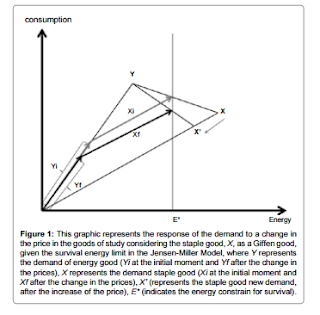Evolutionary Control of Economic Strategy in Fishes: Giffen Behaviour could be a Common Economic Strategy on the Earth?
The great
geneticist Theodosius Dobzhansky said one of the most influential phrases on
modern scientific thought: nothing makes sense except in light of evolution. Although most of economic theory has been developed independently of
evolutionary thought, a study area of great interest is to apply tenets of
evolution to understand the progress of certain economic phenomena in time.
There is no doubt that this interdisciplinary approach could be very fertile,
but many give rise to disagreements due to the interpretation of some economy
process from an evolutionary approach, or certain evolutionary developments
from an economic point of view.
In this
paper, we seek a first stage to apply an experimental evolutionary approach to
an economic problem. For this purpose, we have chosen the problem of the Giffen
goods. A fundamental principle of microeconomics is the Law of Demand, which
assures that as the price of a good increase, consumers demand for that good should
decrease. On the contrary, a situation in which consumers respond to an
increase in the price of a certain good by demanding more of it, this is known
as Giffen behaviour.
 Since
Marshall’s time, the Giffen behaviour is one of the major controversies in
economics, and the existence of Giffen goods are extensively discussed in
most of economics courses. Many economists assume that the Giffen behaviour has
never existed. For example, Stigler said that if an economist were trying
to demonstrate the failure of Law of Demand in a particular market at a
particular time, ‘he would be assured of immortality, professionally speaking’.However, several economists have performed theoretical approaches to the Giffen
phenomenon and provide empirical evidence of the existence of Giffen behaviour.Read More.....
Since
Marshall’s time, the Giffen behaviour is one of the major controversies in
economics, and the existence of Giffen goods are extensively discussed in
most of economics courses. Many economists assume that the Giffen behaviour has
never existed. For example, Stigler said that if an economist were trying
to demonstrate the failure of Law of Demand in a particular market at a
particular time, ‘he would be assured of immortality, professionally speaking’.However, several economists have performed theoretical approaches to the Giffen
phenomenon and provide empirical evidence of the existence of Giffen behaviour.Read More.....
Comments
Post a Comment